The unique design will allow you to flush sand to the corner of the wall with the nose and the side of your sander. Though mainly used for working with the grain, the device does an exceptional job working across the grain to flatten it before working with the grain to leave a clean, even finish.
Although this is one of the quietest belt sanders on the market, some may still find it to be rather noisy.
While being far from the cheapest option on the market, the Makita 9404/2 240V Belt Sander is well worth its price, given that what we have on our hands is probably the most versatile model that is equipped with the kind of power and utility that can handle any type of surface quickly and efficiently.
Belt Sander
1010 watts
210 - 440 m/min
100 x 610 mm
Variable speed control, Dust bag, Speed-adjusting dial, Auto-tracking belt system, Flat top for inverted applications
4.8 kg
3 years
Incorporating several sizable ventilation holes, the model is excellent at dissipating heat and preventing overheating. Its low-profile height lets you get close to the work surface, providing improved sanding precision. The dust-sealed switch prolongs the motor's service life.
The dust bag is not very spacious.
Performant, reliable, and dependable even when the load gets high and the applications become more and more demanding, the DeWALT DCW210B will have no trouble tackling enthusiast and professional sanding projects alike. Plus, with its 0.9-kilogramme weight, the model is easy on the hands.
Random Orbital Sander
20 volts
8000 - 12000 OPM
125 mm
Variable speed control, Low-profile height, Dust-sealed switch, Dust bag, Dust port, Replaceable 8-hole hook-and-loop sanding pad, Texturised rubber overmould grip
0.9 kg (without battery)
3 years
The telescopic design extends it to almost 2 metres in length. The model is equipped with a 90-degree pivoting head that will ensure the ability to follow the contours of any work surface, even rugged or uneven. Thanks to the LED lighting, you will be able to see any shadows created by unsmooth areas.
The device may seem a bit heavy to those customers that aren't used to drywall sanders.
If the walls that you generally deal with tend to be uneven, rough, or bumpy, and you often struggle trying to deliver a neat smooth finish in the areas that are difficult to reach, the Evolution R225DWS is exactly the kind of drywall sander that you ought to look out for.
Dry Wall Sander
710 watts
600-1500 RPM
225 mm
High power with variable speed, Comfortable and flexible operation, LED lighting, 6 sanding sheets, 0 - 90˚ pivoting head, Extendable up to 1.97m
5.8 kg
2 years
The device uses a combination of rotary and orbital actions that ensure an ideal and scratch-free quality sanding on a large variety of woods and metals. Additionally, it is also suitable for sanding down paintwork. With the Velcro-backed polishing pads, you will even be able to polish your car with this random orbit sander.
The model tends to overheat after hours of continuous work.
Even without mentioning the ergonomic design of this model, it would seem quite evident that the Bosch PEX 220 is one of the most outstanding and unique models on the market and will be an absolute bargain for anyone interested in an efficient yet unorthodox random orbit sander.
Random Orbit Sander
220 watts
24000 OPM
125 mm
Sanding plate with Velcro-type fastening, Bosch micro-filter system, Sanding sheet clamping system
1.2 kg
2 years
The built-in dust extraction system leaves the finish smooth and swirl-free, all whilst reducing airborne dust. Double-insulated, the body minimises noise and vibrations so that you can work without hearing protectors or experiencing noticeable hand fatigue.
The handle is not especially ergonomic.
The Black and Decker BDCROS18 will let you accomplish both small- and large-scale sanding projects. Despite its cordless approach, the model reaches 12000 OPM, so you'll be able to get more job done in less time. The included soft pouch enables convenient storage and transportation.
Random Orbital Sander
18 volts
12000 OPM
125 mm
Dust bag, Dust port, Replaceable 8-hole hook-and-loop sanding pad, Texturised rubber overmould grip, Soft pouch for easy storage of tools and accessories, Rocker switch for continual operation, 1.5-Ah slide pack battery and charger included
~1.2 kg (with battery)
2 years
This site is a free online resource that strives to offer helpful content and comparison features to its visitors. Please be advised that the operator of this site accepts advertising compensation from certain companies that appear on the site, and such compensation impacts the location and order in which the companies (and/or their products) are presented, and in some cases may also impact the scoring that is assigned to them. The scoring that appears on this site is determined by the site operator in its sole discretion, and should NOT be relied upon for accuracy purposes. In fact, Company/product listings on this page DO NOT imply endorsement by the site operator. Except as expressly set forth in our Terms of Use, all representations and warranties regarding the information presented on this page are disclaimed. The information which appears on this site is subject to change at any time. More info
Makita 9404/2
Another One From Japan
To those individuals that are new to the world of power tools, housing appliances, and the general so-called Do It Yourself experience, the name Makita probably isn't going to ring any bells. And they aren't necessarily to blame for that since the company is relatively unknown outside of this rather specific section of home appliances. But to those people that know a thing or two about drilling, sanding, mounting, screwing, and fixing, the name Makita is as familiar as Samsung is to the world of electronics or McDonalds in the field of fast foods.
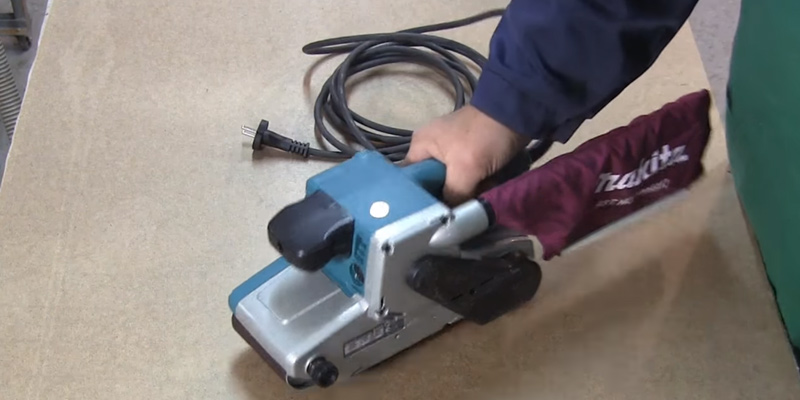
A Versatile Machine
While we do have to start with at least one of the aspects that make this model stand out from the crowd of competition, picking one of them certainly couldn't be described as an easy task since this device seemingly excels at everything it does. First of all, the fact that the Makita 9404/2 240V Belt Sander produces no more than 84dB of sound while utilising every bit of its power makes this model the quietest sander in its class. And speaking of power, an 8.8 AMP high torque 1,010W motor of this sander will be able to deliver the kind of powerful performance that very few competitors will be able to match.
Although what we have on our hands is clearly a powerful and quiet device, one of the biggest selling points of this model, without a doubt, would have to be its versatility. Even though the device in question is a belt sander, this heavy-duty and intelligently designed product will be absolutely perfect for giving extremely smooth results. Moreover, the aforementioned unique design will provide you with an ability to flush sanding to the corner of the wall with a nose and the side of your sander.
Though mainly used for working with the grain, the device does an exceptional job working across the grain to flatten it before working with the grain to leave a clean, even finish. On top of that, the model is also equipped with a speed-adjusting dial that comes in handy when it comes to getting optimum belt speed to suit various workpieces and an auto-tracking belt system that tracks the belt without having to manually adjust it yourself.
Although this device is far from being the cheapest option on the market, the Makita 9404/2 240V Belt Sander is well worth its price, given that what we have on our hands is probably the most versatile model that is equipped with the kind of power and utility that can handle any type of surface quickly and efficiently. We might not go as far as to call it the best electric sander but it's certainly one of the better contenders for that number one spot.
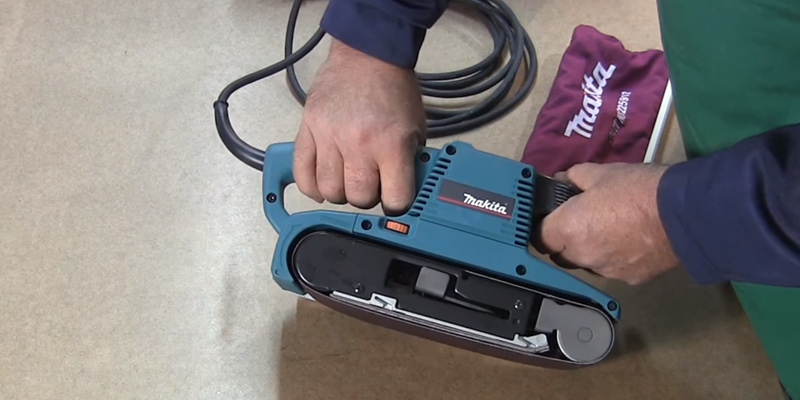
Additional Info
| Last updated price | £249.95 |
| Stock | In stock |
| ASIN | B000056NOA |
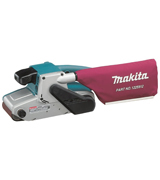
DEWALT DCW210B 20V MAX
A Little Intense
The DeWALT DCW210B is a mean-looking machine, even by the company's pretty high standards on this front. Be it the massive body, the texturised rubber overmould grip, or the sizable palm grip, the model looks quite intense, and we're not complaining one bit.
DeWALT random orbital sanders always come equipped with brushless motors, delivering both the runtime and efficiency that gets the job done. Plus, with brushless motors, the required maintenance is practically nonexistent, saving you time and money in the long run. But, as much as this machine borrows from its yellow-black relatives, some things have changed.
To name a few, the model's low-profile height would have to be the biggest one, letting you get very close to the work surface and, therefore, enabling precise sanding. What has also changed is the dust-sealed switch. As you can imagine, with this tight seal, the switch is protected from dust ingestion, so its service life is prolonged.
Something that has been prolonged as well is the sander's variable speed control dial. This time around, you can set the dial anywhere between 8,000 and 12,000 OPM, matching the application at hand. Likewise, the replaceable 8-hole hook-and-loop sanding pad lets you quickly and, what's equally important, easily change papers.
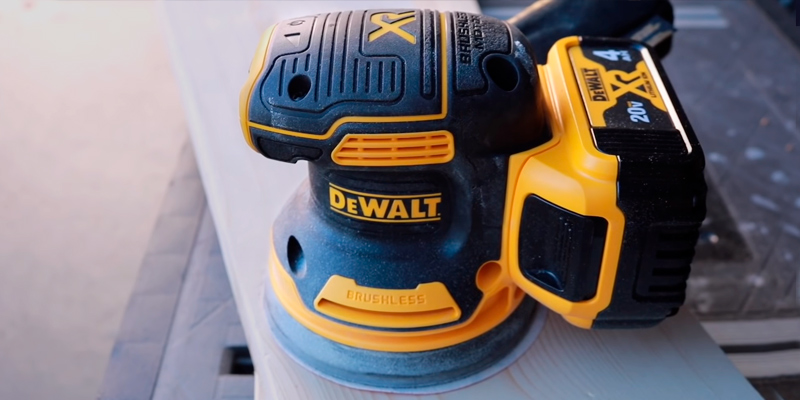
Ventilation Holes
All that being said, some things remain the same. For starters, with random orbital sanders painted yellow and black, you're always getting high-quality dust bags, and the subject model is no exception. In fact, the one-handed locking dust bag can be attached to the machine in a reasonably secure fashion, aiding dust collection, or you can have the machine attached to the DWV010 or DWV012 dust collectors instead. The one attribute that's a little unfortunate about the included dust bag is that it's not necessarily spacious. But, considering that the model weighs 0.9 kilogrammes, you can why that is the case.
Aside from that, the sanding pad measures 125 millimetres, which is more or less standard these days. Where the sander's electromotive force is concerned, the unit pushes 20 volts, which is also along the standard lines nowadays. What is a little less standard, however, is the large ventilation holes on the palm grip, ensuring sufficient heat dissipation and preventing the model from overheating.
Bottom line, if you want an electric sander that is reliable and performant, there's a pretty good chance you will find the DeWALT DCW210B to your liking.
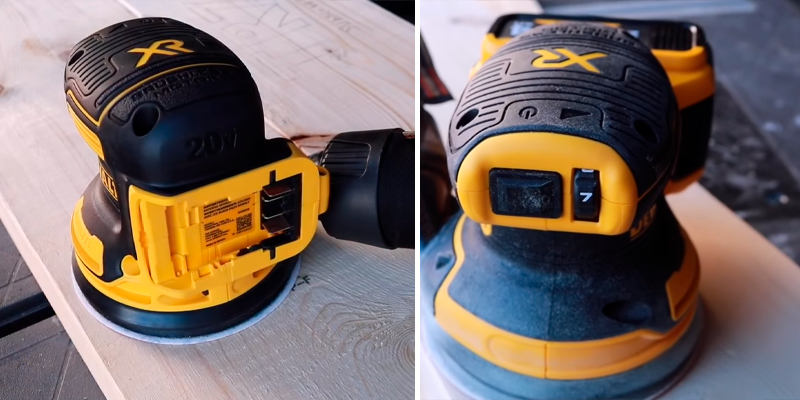
Additional Info
| Last updated price | £145.82 |
| Stock | In stock |
| ASIN | B07JQM7C28 |
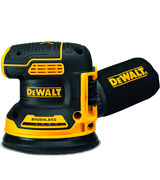
Evolution R225DWS
It's Time to Evolve
Whether you're experienced in the field of Do It Yourself kind of applications or even if you have done your fair share of sanding jobs, from time to time you will inevitably encounter the sort of surface that the conventional means and a regular electric hand sander simply won't be able to handle. If you've stumbled upon a particularly difficult wall yourself or just looking to prevent this kind of situation from happening in the future, you should definitely look towards the Evolution R225DWS, an exceptional drywall sander that will allow you to sand from virtually any position. With this device in your hands, no seemingly difficult corner is going to be able to present any kind of challenge to you.
The first thing we would like to mention about this electric sander for walls would certainly have to be a fairly unique structure of this device. Even though the model weighs about 6 kilograms, which may seem excessive if you're talking about a pistol grip sander, this is a fairly acceptable number for a drywall sander. What's more interesting is that the telescopic design of this model provides you with the opportunity to extend it to almost 2 metres in length and that will absolutely come in handy when you're going to try to sand those hard-to-reach areas with an acceptable level of comfort. But that's not all this device boats in terms of comfortable and flexible operation. With this model, you're also getting a 0 - 90˚ pivoting head that will ensure the ability to follow the contours of any work surface, even if your wall is rugged and uneven.
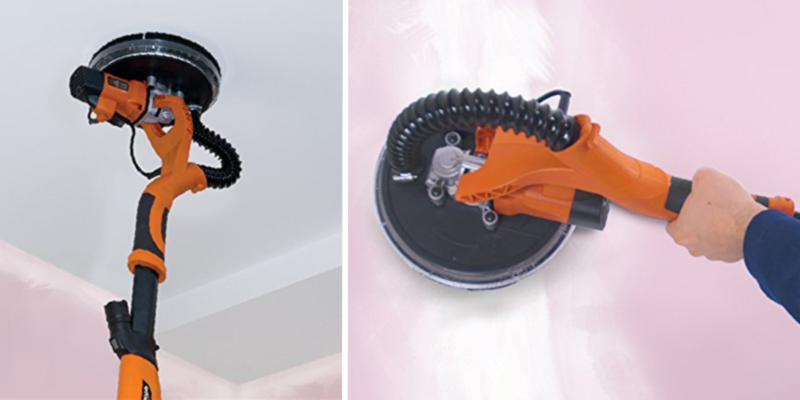
Shadows Are no Longer Your Enemy
Now, of course, we would have to talk about the motor of this device since it is every sander's bread and butter and this drywall sander is no exception to that rule. Equipped with a powerful 710W motor, this device is capable of sanding with variable speeds, reaching a maximum amount of 1500 rotations per minute, which is up to 10 times faster than your regular and conventional approach. Whether you are looking to sand joints in plaster walls and ceilings or remove old finishes from your surface, this product will be able to do that better than virtually any other drywall sander on the market.
And to go back to the design aspect of this model, we would be remiss not to mention the fact that this drywall electric sander comes equipped with soft grips on the main handle and a bail handle that will be absolutely indispensable when it comes to effective control and perfect weight balance. Furthermore, you also receive LED lighting around the entire pivoting head. This kind of design will provide you with the opportunity to see any shadows created by unsmooth areas even when the main lighting source proves to be insufficient. And if that's not enough, the package also includes six mountable sanding discs that come in a variety of different grades to suit any application. Along with the sanding discs, you receive a 4-m hose that is adjusted to the end of the pole and will be able to fit the absolute majority of vacuum ports. To sum it up, if the walls that you generally deal with tend to be uneven, rough, or bumpy, and you often struggle trying to deliver a neat smooth finish in the areas that are difficult to reach, the Evolution R225DWS is exactly the kind of drywall sander that you ought to look out for.
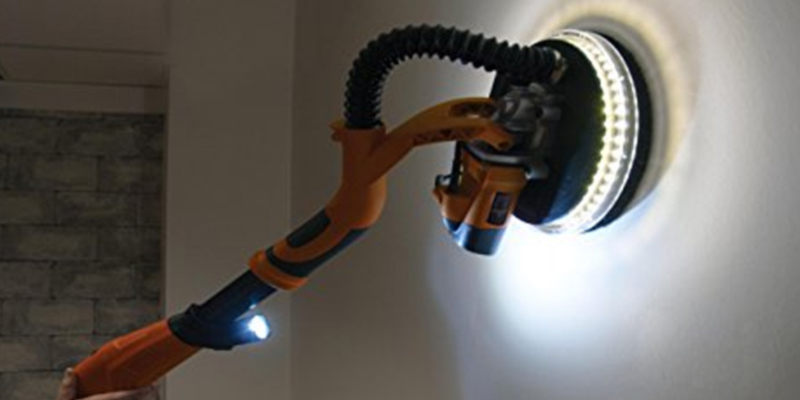
Additional Info
| Last updated price | £149.99 |
| Stock | In stock |
| ASIN | B01N5GGQOW |
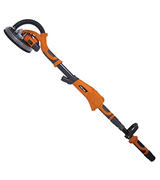
Bosch PEX 220
The Secret to Its Success
There are certain companies that have managed to make a name for themselves in the world of power tools and even in a division as specific as sanders. And then, there's Bosch, a company that needs no introduction when it comes not just to the field of power tools and home appliances but also to electronics and engineering devices in general. One of the keys to the company's success is the fact that, even though they tackle so many different operations, they always make sure to hire the right people for the job. So even though Bosch themselves aren't necessarily experts in the field of electric sanders, you can rest assured knowing that the Bosch PEX 220 was designed and manufactured by professionals that know the ins and outs of this subject in general and the industry in particular.
One of the things that make this model from Bosch stand out from the crowd of competition and the secret to the product's commercial success is its distinct combination of rotary and orbital actions. What this kind of approach does is ensure an ideal and scratch-free quality sanding on a large variety of woods and metals. Additionally, this kind of structure also makes the device suitable for sanding down paintwork. Moreover, with the appropriate Velcro-backed polishing pads, you will be able to even polish your car with this random orbit sander.
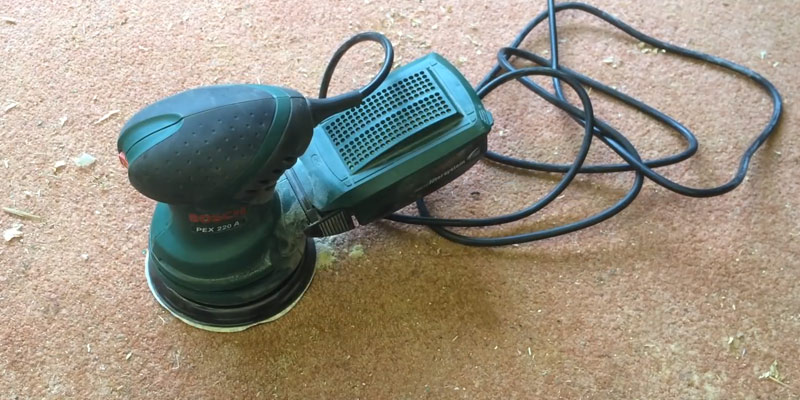
The One That Stands Out
There are two simple but major differences between the Bosch PEX 220 and a regular orbit sander. First of all, the base (also known as the head) of this device is round and not rectangular which is exactly the reason why the model is capable of tackling polishing jobs. Second, the sanding process itself substantially differs from the one that your standard orbital sander provides. This difference manifests itself in a few ways, the biggest one of which is the fact that the sanding discs themselves are attached using a Velcro type of system. The biggest advantage of this structure is that these discs are easy to fit and remove. They're also pre-punched with holes thus allowing the dust extraction system to work as efficiently as possible without becoming a liability. On top of that, the sanding pad works in an orbital and rotary movement at the same time. With this type of approach, what you receive is up to five times faster material removal compared to a regular orbital sander and the finish is completely scratch-free which is more than suitable for when the wood is to be varnished or stained.
We would also like to mention a few other things that cement this model as one of the most extraordinary random orbit sanders on the market. The manufacturers refer to the first one as a Sanding Sheet Clamping System that comes equipped with Velcro-type Fastening. The biggest advantage of this system is an extra-large sanding surface (125 mm) comprised of the high-quality magnesium sanding plate and a powerful 220W motor, both of which ensure fast sanding on large areas. Furthermore, the device comes with an integrated Microfilter System that conveys up to 80% of the dust at high speed directly through the sanding sheet and sanding pad into the transparent, ribbed filter. The box can be emptied quickly and easily, so it can be used continuously which results in the clean workplace, clean air, clean results, even without having to use a vacuum cleaner.
All in all, without even mentioning the ergonomic design that makes this device perfectly suitable for one-hand operation, it would seem quite evident that the Bosch PEX 220 is one of the most outstanding and unique models on the market and will be an absolute bargain for anyone interested in an efficient yet unorthodox random orbit sander.
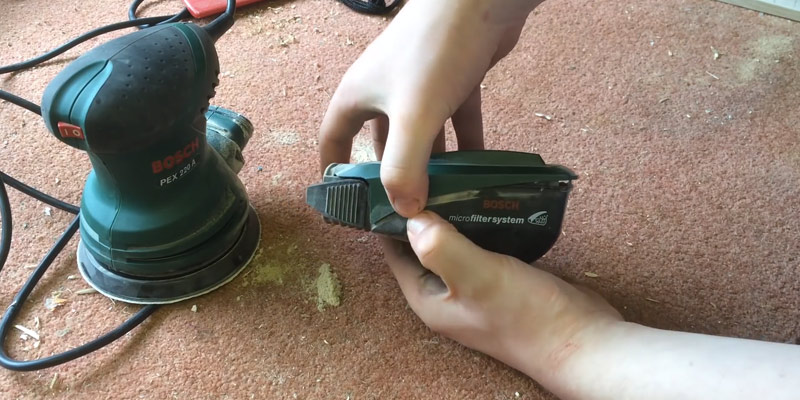
Additional Info
| Last updated price | £49.95 |
| Stock | In stock |
| ASIN | B0002KHIN0 |
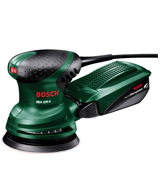
Black and Decker BDCROS18 18v
Smooth, Swirl-Free Finish
The Black and Decker BDCROS18 is clean, that's the word that this model should be associated with first. Before everything else, what separates this small but powerful tool from most random orbital sanders is its integrated dust extraction system. With this system, the subject machine leaves a smooth, swirl-free finish, all whilst minimising airborne dust. Because that's the case, you can complete even more ambitious projects without cleaning up afterwards.
The model's second-biggest strength is its rocker switch. Since you don't have to hold this switch down the entire time, the model lets you shift the grip without taking a pause, so you can tackle prolonged tasks without fatigue. In general, the palm-grip handle seems and feels comfortable enough. As always, the grip is textured and overmoulded, which means that even sweaty hands should be able to hold this machine without worrying about slipping. That being said, its outline is not very ergonomic. As you can tell from the pictures, you cannot necessarily clasp the handle, meaning that the grip usually feels a little awkward and insecure, even though it is not the case. From where we're standing, the sander's next iteration could use a few cutouts or more space below the handle, enabling a firm grip, but what's done is done.
What is also done is the body's double insulation. Adopting two insulation layers, the model minimises noise, letting you work without wearing hearing protectors. To add more, the double-insulation approach also reduces vibrations, therefore reducing hand fatigue.
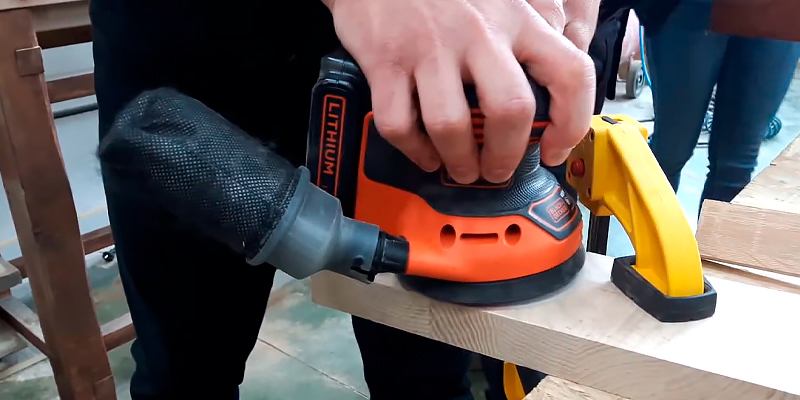
Easy Storage
Removing the more important attributes from the equation, the best thing about this machine is the replaceable 8-hole hook-and-loop sanding pad. With this pad, changing papers becomes a lot less strenuous. What also becomes a lot less strenuous is storage but, in this case, the sanding pad has nothing to do with it. What enables hassle-free storage is the soft pouch that's boxed with the package. Whilst it is nothing special, the pouch fits the tool and the accessories just right, letting you transport and store it with relative ease. These accessories include the 1.5-ampere slide pack battery and the charger that allows you to recharge it. Also included is a mesh sanding sheet, which is a nice little addition as this sheet lasts 4 times longer than conventional discs.
Long story short, the Black and Decker BDCROS18 is a dependable cordless model that will be able to accommodate both small- and large-scale sanding projects.
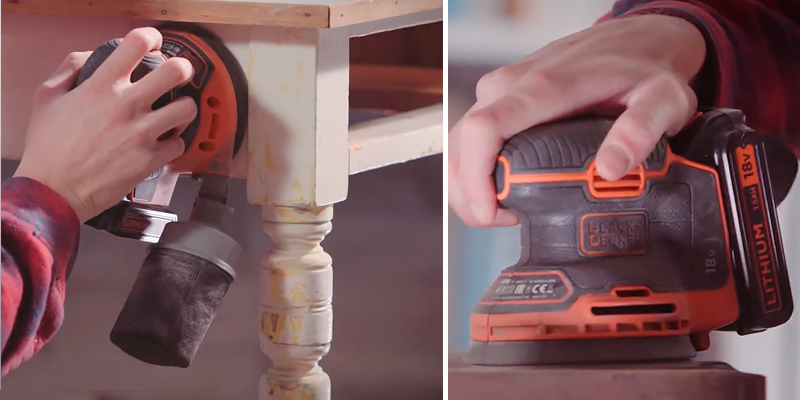
Additional Info
| Last updated price | £85.95 |
| Stock | In stock |
| ASIN | B07F4BCR2Z |
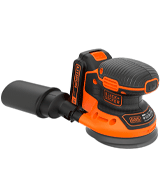
What Is an Electric Sander?
Those who’ve ever done repairs or made anything of wood faced such tasks as grinding or sanding. This process might not be to your liking, for it requires care, it's pretty monotonous and time-consuming. Previously, high-quality sanding took a lot of time and anyone engaged in the sanding work might have thought much about speeding the process up. Fortunately, responding to the user needs, there are many sander and grinder machines, designed for any occasions and tasks and serving both professionals and home craftsmen. To make sure the result will fit your ideas, it’s important to check a variety of sanders and to know well what jobs you will use it for. For this review, we've hand-picked 5 best electric sanders available out other in hope to make it easier for you to find the right tool.
For completing jobs related to carpentry and wooden furniture making, please, consider buying a jig saw designed for figural wood cutting and a circular saw that is best suited for cutting wood boards.
What Features to Compare
Type
To choose the right sander, think first about what you’re going to use the tool for. Depending on the task, you’ll need to use the sander of the right type — an orbital sander, a random orbit sander, a disc sander, a belt sander, a detail sander, you can also choose between a hand sander and a stationary sander machine, a power sander and a simple manual one — the variety of types and applications is immense! Each sander is primarily designed for specific tasks. For example, orbital sander tools are perfect for the finish sanding of large flat surfaces. If you’re seeking for a hardwood floor sander, a wall sander (or maybe both) that will provide you with a neat smooth finish, pay attention to this type of sanders. A belt sander is great for quick rough sanding, the high speed of the belt makes it easy to quickly remove a coat, smoothen or curve the workpiece, remove old paint or rust. However, due to the high speed, there might be chips and scratches on the treated material, which requires further sanding with a more delicate sander polisher. A random orbit sander is a universal sanding tool, it easily copes with the finishing sanding, and if necessary you can use a coarse abrasive to remove old coating or paint, remove bumps or round out the edges. The only thing this sander cannot handle is inner corners where its round sole pad won’t get. A detail sander tool does excellent job finishing corners and other hard-to-reach places. The design of the sole makes it easy to handle furniture and complex shapes. Stationary desktop sanders are well-suited for the treatment and precise shaping of small wooden, metal, plastic, ceramic or composite details. If you’re into professional sanding, make sure to have all the types of sander tools at your disposal.
Performance
The performance of a sander determines the time you spend on sanding and the amount of work. There are several factors affecting the performance. The power and the motion speed of the abrasive surface are common parameters for all the sander types. The power determines the efficiency of the sander motor and the load it can withstand. The time spent on sanding and the quality of sanding. The higher the speed, the faster the sanding, yet the quality decreases. Low sanding speed provides for better quality, but it takes more time to complete the sanding. The speed of a belt sander is usually measured in surface feet per minute (SFM), the operating speed of other sanders is usually measured in orbits per minute (OPM). Another parameter important for any detail, orbital or random orbital sander is the orbit diameter of its pad circular movement. The smaller the sander orbit diameter, the smaller the treated area, but the better the sanding. The adjustable speed will allow picking the optimal parameters for different materials. The size of the sander working surface determines the sanding speed, but the small size will allow you to handle fine details more easily.
Convenience
Comfortable use of the sander increases productivity and reduces fatigue. That’s why the convenience of the tool is a very important parameter when choosing the right sander. Be sure to consider the type of the abrasive material and the way it’s attached to the sander. Although most sander tools use specific abrasives with adhesive backing, a number of sanders allow using universal sandpaper fastened with clamps. Make sure that the sander you choose has a dust collector and that you can attach to a vacuum tool. The rubberized grip lets you keep a firm hold on the sander during operation. Extra accessories can facilitate sanding, while a carrying bag or a case will provide convenient transportation or storage of the sander and accessories.
Useful Information
Sanding Isn't as Glamorous as One Might Think.
Even if you were to survey thousands of people that are either professionally engaged in this particular field or simply prefer to utilise power tools in order to do some certain kinds of job around the house what their favorite DIY activity is, the chances that a major part of them is going to mention sanding wood are virtually nonexistent. And if you have ever done it yourself, there's a good chance you won't be surprised by this fact. Sanding is really no more popular than scraping paint or doing your own dental work. However, if you're an active do-it-yourself kind of person, sanding wood is virtually unavoidable.
And the only way to make this exhausting and often tedious task a little more pleasant is to employ the services of an electric sander since they are the best, quickest, and easiest way to sand wood smooth. Now, since there are quite a few different sizes and types of sanders available on the market, we're not going to go into details on each one of them but simply provide you with some general instructions that will come in handy for anyone using an electric sander for the first time.
How to Get Started.
In order to use a sander, all you really need to know is, first and foremost, how to attach the sandpaper to the sander. In order to do that, you will first have to locate the metal (sometimes a different material is used but, generally speaking, it is almost always metal) locks on the sides of the sander. Now, you ought to pull down and out on each of the locks. You're doing that in order to release the end clasps that will hold the sandpaper in its place. After you're done with that, you should take a sheet of sandpaper and tear it into four smaller parts. Now, take one of those fourths and place it on the bottom pad of the sander. Once you're done doing that, the next step is to tuck the sandpaper under each end clasp and lock each and every one of them down. After that, you should press the electric sander's power button, which is usually located at the top of your model. All that is left to do is to plug the device in, flip the switch and you are ready to sand.
It Really isn't That Dangerous.
One thing we would like to mention is that while your electric sander is operating, the sandpaper tends to move around quite rapidly. There's a chance you might think that if your hand touched the sandpaper it would result in mountains of pain. However, you would be pleasantly surprised to know that no harm will come to you if your hand or anyone else’s hand, for that matter, comes into contact with the paper while the electric sander is on. Meaning that, while you shouldn't disregard some general rules of conduct when it comes to any power tool, this one is one of the safest devices of the whole family and you can use it freely without having to worry about hurting yourself or anyone around you.
FAQ:
Q: How many types of electric sanders are there?
A: There are quite a few different types of electric sanders for wood and naming all of them would certainly take some time. But the list of the most popular ones includes but isn't limited to flap sanders, belt sanders, disc sanders, oscillating spindle sanders, random orbital sanders, detail sanders (which include mouse and corner sanders), orbital sanders, straight-line sanders, stroke sanders, drum sanders, wide-belt sanders, and profile sanders. And if you find this list all too confusing, there's no need to worry. Unless you're a professional looking for a very specific application, a belt sander, an orbital finishing sander, and a random orbit sander will do the job for you.
Q: Why should I get a belt sander?
A: If you're looking for a type of product that would be able to smooth large, flat surfaces, especially some of the really rough ones, there isn't really any kind of model that will be able to beat the high speed and brute strength of a belt sander. This heavy piece of power tool equipment utilises sanding belts, which are continuous loops of reinforced abrasive cloth that fit over two cylindrical drums. The device's motor operates the rear drum while the front drum is able to spin around freely. A tension-release lever will provide the user with the opportunity to easily slip the belt onto the drums. In order to keep the belt running the way it is supposed to, the majority of sanders feature a tracking adjustment knob that you can turn to centre the belt.
Q: What are the main advantages of an orbital finishing sander?
A: There is a number of advantages that make an orbital finishing sander such a popular choice among the majority of DIYers. But if we had to pick a few of them, it would have to be the fact that these models tend to be lightweight, easy to control with just one hand, and also relatively quiet, at least compared to belt sanders and some of the other types of models out there. Not to mention the fact that it is next to impossible to induce any sort of physical damage to the workpiece with this type of sander. However, since these devices tend to be relatively docile, an orbital sander isn't particularly useful for heavy stock removal and is more intended for ultra-smooth wood sanding, rounding over sharp edges, sanding off hardened wood putty, and knocking down dried coats of paint or varnish.
Q: What is a random orbit sander?
A: A random orbit sander is the kind of model that would be best described as something falling somewhere in between a belt sander and an orbital finishing sander. It can be quite easy to confuse a random-orbit sander with an orbital sander: not just because two of these names sound relatively similar but also because the tools share a common design, which generally manifests itself in a compact housing with rounded palm-grip tops. However, there's at least one small yet rather crucial difference between these two types of sanders: an orbital sander features a square sanding pad, while a random-orbit sander includes a round pad.
Sources:
1. Joseph Truini Know Your Power Sanders, And How to Use Them, Popular Mechanics. October 2, 2012.
2. Selecting the Right Power Sander for the Job, DoItYourself.
3. Kit Stansley Choose The Right Sander for Your Project, LifeHacker. May 9, 2014.
4. Essential DIY Tools — Electric Sander, Addicted 2 Decorating. March 21, 2013.
5. DIY Basics: Essential Guide To Sanders, Handyman.
6. Sander, Wikipedia. April 9, 2016.
7. Lee Wallender 5 Types of Sanders For Your Remodel Project, The Spruce. January 24, 2017.
8. How to buy a sander, Which?
9. Hand and Power Tools, OSHA.


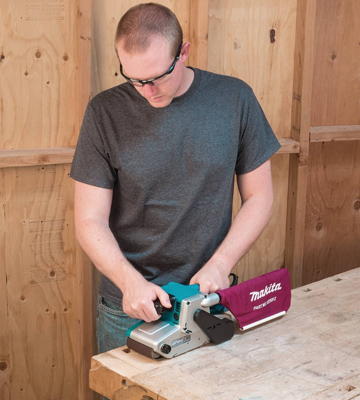
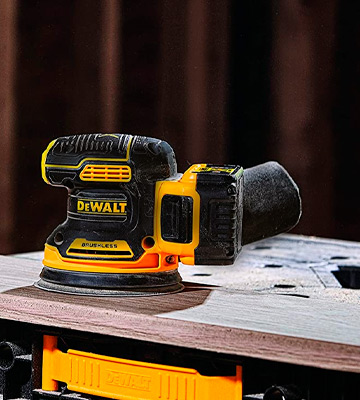
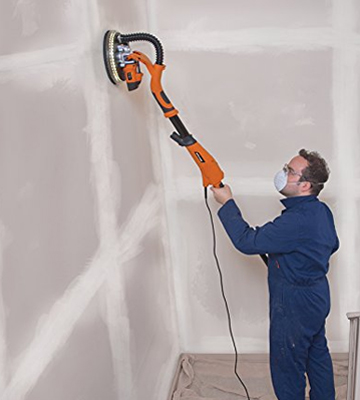

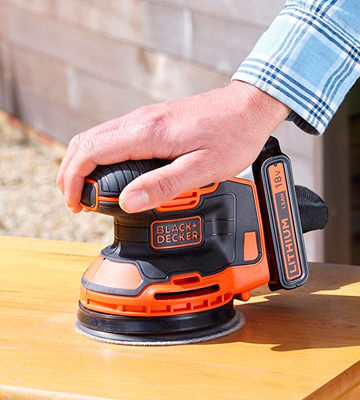

Your comment was successfully sent
Error! Please try again later